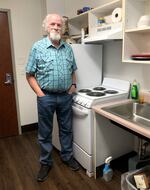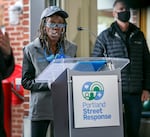
Portland resident Don Hilts was homeless and living in his van before Portland Street Response staffers connected him to a homeless services organization that helped find him affordable housing.
Tiffany Camhi / OPB
Portland Street Response won’t solve the city’s growing homelessness problem. It was never meant to. The program’s self-described goal is to provide a first-response alternative to police or other emergency services for people experiencing mental and behavioral health issues that are not life-threatening.
But still, some clients of the program have achieved one of the very best outcomes that could come from an interaction with a Portland Street Response team: stable and affordable housing.
Don Hilts, 63, is one of them.
“The first couple of days, I kept waking up pinching myself, thinking this is a dream,” said Hilts, referring to his small studio apartment in Downtown Portland. “It can’t be real.”
He credits his journey from homelessness to housing entirely to Portland Street Response.
A call to 911 this past summer was all it took. Hilts was living out of his Chevrolet minivan with his cousin and her two cats in Southeast Portland at the time. He said he called the emergency line after a tense encounter with a fellow houseless Portlander, across the street from his parked van.
“The guy started screaming and yelling, [saying] he was gonna kill somebody, beat somebody up,” said Hilts. “We didn’t know if he was crazy or what, so we called the police.”
By the time Portland Street Response got there, said Hilts, the man in question had moved on. But the staff still took the time to check in with the other houseless individuals still there, including Hilts and his cousin.

"We've worked on defining our lane a little bit better: mental health, behavioral health, substance use, intoxication and general welfare check calls," said Portland Street Response program manager Robyn Burek at a November training for new staff.
Tiffany Camhi / OPB
“That’s when everything started,” said Hilts. “The next thing you know, they’re filling out a whole bunch of paperwork for us and got us on waiting lists for I don’t know how many apartments.”
It took time and dedication from both Portland Street Response workers and caseworkers from other homeless services organizations, but Hilts said his cousin was placed into temporary housing in the fall. He moved into his own studio on Dec. 7.
Now the program is gearing up to serve even more people like Hilts. Early next year, Portland Street Response is set to begin 24/7 operations across the city. It’s the next step for a program that has come a long way in a short amount of time, growing from a grassroots campaign to Portland’s first new emergency responder branch in nearly 150 years.

Commissioner Jo Ann Hardesty speaks during a press conference regarding Portland Street Response team, Feb. 16, 2021.
Kristyna Wentz-Graff / OPB
Departing Portland City Commissioner Jo Ann Hardesty was an early supporter and helped shepherd the program through city council. A pilot of Portland Street Response first launched in Southeast Portland’s Lents neighborhood in February 2021. It consisted of an unarmed emergency response team of two community health workers, one mental health therapist and a paramedic. The team was equipped with one van filled with supplies like food, water, clothing and tents.
Britt Urban was one of the first responders who helped launch Portland Street Response. She said the first few months of the pilot were quiet.
“We were pretty slow a lot of the time,” said Urban, a licensed clinical social worker. “Some days we’d have zero calls and others we would have two or three.”
It was an underwhelming beginning for a little pilot program that had gained plenty of support amid the widespread racial justice protests of 2020. But Urban said a lot of learning occurred during the first six months of the program. Houseless individuals, community members and business owners were educated on the purpose of the program and staff at the Bureau of Emergency Communications were trained on how to best utilize this new emergency response option.
The program, housed within the city’s fire bureau, also had a lot to prove in its first year of operations. To gather more support from city institutions like the Portland Police Bureau and continued funding from Portland City Council, the small team had to demonstrate what a different response to non-criminal and non-violent 911 calls could look like. It also had to prove it could relieve pressure on the city’s strained police resources.
“It’s exciting to be part of building this new program,” said Urban, who has now moved on to a managing role within Portland Street Response. “I would also say it’s been really challenging, as far as the stress level, and not having the stability of a longstanding program.”

Joseph Stegemeyer takes a call at Portland’s Bureau of Emergency Communications, Dec. 13, 2022. Staff at the call center are trained to determine when to dispatch Portland Street Response as a non-police response to 911 calls involving people experiencing a possible mental health crisis.
Kristyna Wentz-Graff / OPB
Even though the program does not have the support structures of a longstanding department, like PPB, independent evaluations of the program by Portland State University researchers have consistently given it high marks. The most recent report, released on Dec. 15, found Portland Street Response teams responded to more than 3,200 calls after expanding citywide in April. There was a more than 3% reduction in calls that would have normally gone to police, a nearly 19% reduction in police response to non-emergency welfare checks or “unwanted persons” calls and a more than 3% reduction in fire department responses to behavioral health calls or illegal burn calls. The evaluation also reported extremely high satisfaction rates, 4.7 out of 5 stars, from Portland Street Response clients. Since April, the program has responded to calls from 8 a.m. to 10 p.m. every day.
“The pilot year was filled with lots of questions of where we would end up,” said Portland Street Response program manager Robin Burek. “I feel really good about where we’re standing.”
Burek is currently wrapping up a fall hiring frenzy to reach a roster of 58 full-time staff. The program’s new employees will help build out a total of six emergency responder teams that will be able respond to calls day and night in the new year.
“My number one priority is to make sure that my staff is fully trained and ready to go,” said Burek. “You know, going overnight, sometimes can be like an island on your own and I really want to make sure that the team is prepared and ready to go.”
Onboarding for new Portland Street Response staff is comprehensive. They receive in the field training through ride-alongs with current staffers and about seven days of classroom time discussing topics like crisis de-escalation, trauma-informed care and harm reduction techniques.
But, even after its expected 24/7 expansion next year, there will still be room for Portland Street Response to grow. The PSU reports included several recommendations like allowing teams to respond to calls inside private homes and calls involving suicide. This matter must be hammered out with the Portland Police Association. Burek said talks with the police union have been going on for the better part of this year and are making headway.
Long term financial stability for the emergency responder program is also high on the list of future needs. The total Portland Street Response adopted budget for its current fiscal year (July 2022 - June 2023) is $12.6 million dollars. Nearly half of that is coming from the city’s general fund. Burek said she wants to become less reliant on the city for funding and she’s looking towards Medicaid reimbursement as a new possible source of revenue for the program.

In this undated photo supplied by City of Portland, Portland Street Response employees at work in the city. Portland Street Response has grown from a staff of four to more than 50 in under two years.
Courtesy of the city of Portland
“The biggest thing that I’m working on right now that will impact our future is the Certificate of Approval with the Oregon Health Authority and getting certified as a mobile crisis intervention team,” said Burek.
In late November OHA revised criteria for its mobile crisis intervention service certification, broadening its scope to include programs like Portland Street Response. Burek said the program previously did not qualify because it doesn’t offer ongoing care, like outpatient treatment plans, to its clients. Burek is planning to apply for that certification in January.
But even with another revenue stream there’s still only so far Portland Street Response can go to help people in crisis. Urban said some clients just need a sobering center, but there’s no resource like that to be found in the city currently. Others need mental health care that falls between intensive, inpatient psychiatric care and once a month, outpatient therapy visits.
Also, more than half of Portland Street Response clients were experiencing homelessness, 65%, so Urban said more short-term shelter beds and affordable, long-term housing options are badly needed.
“Our crisis response could go further than making someone safe in the moment and providing basic needs,” said Urban. “We are seeing that as a challenge right now.”
On the surface, it may look like Portland Street Response just offers food, water and a friendly ear. But Urban said it is much more than that. It is about building enough trust with vulnerable populations to help them move towards a healthier lifestyle.
Hilts credited trust in Portland Street Response’s peer-support specialists as the reason he has housing now. It also helped that every time they checked up on him, they had a hot meal and kind smile, he said.
Hilts is not sure what the future holds for him and his cousin. For now he is grateful to Portland’s newest emergency responder for helping get both him and his cousin a safe place to live, just in time for the holidays.
“There’s a lot of people out there, like me, that are good people who are homeless and [Portland Street Response] is doing something about it,” said Hilts. “As far as I’m concerned, they’re the greatest people in the whole world. You might as well call them angels.”




